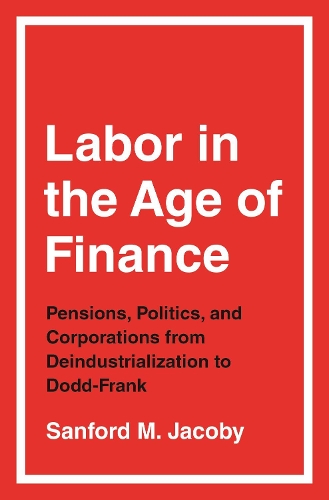
Labor in the Age of Finance: Pensions, Politics, and Corporations from Deindustrialization to Dodd-Frank
(Hardback)
Available Formats
Publishing Details
Labor in the Age of Finance: Pensions, Politics, and Corporations from Deindustrialization to Dodd-Frank
By (Author) Sanford M. Jacoby
Princeton University Press
Princeton University Press
15th October 2021
United States
Classifications
Tertiary Education
Non Fiction
Finance and the finance industry
Economic history
Corporate governance: role and responsibilities of boards and directors
Political science and theory
History of the Americas
Social and cultural history
331.09730904
Physical Properties
Hardback
368
Width 156mm, Height 235mm
Description
From award-winning economic historian Sanford M. Jacoby, a fascinating and important study of the labor movement and shareholder capitalism Since the 1970s, American unions have shrunk dramatically, as has their economic clout. Labor in the Age of Finance traces the search for new sources of power, showing how unions turned financialization to t
Reviews
"Jacoby brilliantly illustrates the Sisyphean character of labors exertions on the tilted terrain of finance. Yet, equally importantly, he wisely shows how unions began learning to fight on a battlefield likely to become even more decisive in coming years. Anyone who seeks to understand labors present predicament or fight those future battles simply must read this indispensable book."---Joseph A. McMartin, Labour History
"A must read for labor, management, and finance scholars and their students. . . . At a time when financialization, extreme inequality, and calls for accountable capitalism are center stage, Jacobys book is timely. He offers a landscape of historical examples of labors financial strategies, what has worked and what hasnt, and why it is so difficult to change deeply embedded government rules and corporate norms that favor the rich and powerful. His research is painstaking and impeccablebringing to life his inside stories of union shareholder campaigns and political struggles over financial regulation."---Rosemary Batt, Industrial and Labor Relations Review
"Jacobys book is an impressive and vital addition to the history of organised labour. By also getting readers to think about the question of what modern financialization has wrought, it has much broader relevance. It deserves a wide readership."---Jeff Borland, Economic Record
"Jacoby focuses on explaining his source material, rather than belaboring broad lessons. This will make the book of interest to employment relations practitioners and to academics across multiple disciplines. But, several general themes emerge . . . labors role (both as handmaid and as critic) in the shareholder revolution and financialization. . . . the ubiquity of feuds and bedfellows in strategic campaigning. . . . Jacoby demonstrates how these webs of ownership and employment intermediation, often identified as a barrier to traditional worker bargaining power, also offer new sources of worker leverage. Beyond these core themes, Jacoby litters the book with insights that could fill a whole shelf of future dissertations."---Nathan Wilmers, Perspectives on Work
"Readers of this book will encounter numerous lessons of value."---Laura J. Owen, Economic History Association
"Jacobys account offers a wealth of detail. . . . All of this material is organized into a coherent and compelling argument, and it will benefit those interested in corporate governance, the history of corporate social responsibility, and the role firms play in mediating economic inequality."---Bruce G. Carruthers, Administrative Science Quarterly
"[Jacoby] documents, with remarkable clarity, the processes which led to the union movement changing its strategic direction towards financialisation, and in doing so more or less abandoning its historical priorities. . . . My strong recommendation is to read and follow the book in its entirety, and with care and attention to detail."---Gaby Ramia, Labour & Industry
"[Labor in the Age of Finance] is clearheaded. . . . Jacoby recognizes that there are still broad structural political and economic forces arrayed against a real resurgence of unions."---Neil Fligstein, Contemporary Sociology
"[A] fine book. . . .This smart and sober volume is unsurpassed as a starting point for anyone who seeks to understand both the urgent necessity and the enormous difficulty of making financial markets more accountable to the common good."---Joseph A. Mccartin, Finance & Development
"
Jacobys book provides a major contribution to the literature in political economy of corporate governance and labor.
"---Thibault Darcillon, Competition & Change"By connecting two bodies of scholarship that do not often draw illumination from one anotherlabor and financial historyJacoby succeeds in shedding light on a critical episode in the American union movements ongoing efforts to reinvent itself for the twenty-first century."---Max Fraser, Political Science Quarterly
"Sanford Jacoby has achieved a truly rare feat: taking a narrow, specialized, and somewhat obscure topic and shaping it into a magisterial narrative that provides true understanding of the players and the drama involved. Labor in the Age of Finance is a tour de force that captures the labor movements efforts to muddle through during the ascendance of corporate finance without losing its way."---Matt Bodie, Jotwell
"Sanford Jacoby has produced a series of highly important books that trace the evolution of the modern corporation in the United States, its employment practices, and examined the consequences for organized labour and working people."---Peter Gahan, Journal of Industrial Relations
"Excellent."---Matthew Soener, International Journal of Comparative Sociology
Author Bio
Sanford M. Jacoby is Distinguished Research Professor of History, Management, and Public Affairs at the University of California, Los Angeles. His books include Modern Manors: Welfare Capitalism since the New Deal and The Embedded Corporation: Corporate Governance and Employment Relations in Japan and the United States (both Princeton).
